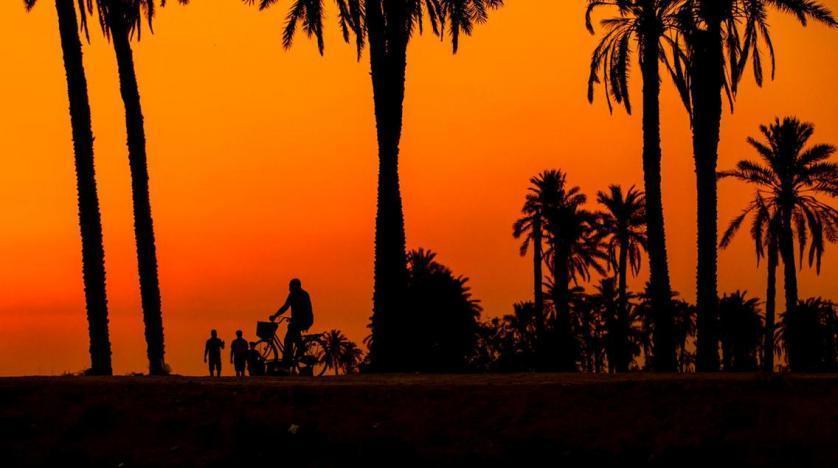
Under the autumn Iraqi sun, Abbas Abbud expertly scrambles up the ragged trunk of the palm tree. His mission? Picking the juicy dates overhead, and keeping this ancient profession alive.
At 48, he is the last of several generations of "palm climbers," the nickname given to the community that has harvested southern Iraq's date palms for the past 6,000 years.
But decades of back-to-back wars, climate change and little support for farming communities have turned Iraq's iconic date palms and their harvesters into a rare breed.
"We spend more than ten days on one palm field, but in recent years the numbers of trees and fields have decreased, affecting our jobs," says Abbud.
Every year, from October to December, he climbs into a harness, machete in hand, to slash dates from palms up to 23 meters (75 feet) tall.
Cutting one palm earns him a mere 2,000 Iraqi dinars, or less than two US dollars.
With poverty rates expected to reach 40 percent this year, Abbud can't afford to skip the date season in Iraq's farming heartland of Diwaniyah province.
One of his biggest clients is the Kariz family, which owns some 4,000 palms of different varieties.
"Ever since I can remember, we've had vast date fields," says Herban Kariz, 69, the family patriarch.
He strolls through rows of palms, under which workers have placed large stretches of tarp to catch the bouquets of yellow and caramel-colored dates cut from tree tops.
"We always held reunions for the harvest - it's been a family tradition since childhood," he tells AFP.
Under former dictator Saddam Hussein, the Iraqi state purchased dates from farmers at a price higher than the market rates, then packaged, marketed and exported them as far afield as the United States.
The era is remembered as the golden age of Iraq's date industry.
Today, palms number less than half of the 30 million that dotted the country just two decades ago, says Mohammed Kashash, the head of Diwaniyah's farming cooperatives.
He blames the virtually ceaseless armed conflicts in Iraq, a struggling economy and insufficient government support.
"As the state doesn't support us, production and sales are down," Kashash tells AFP.
Iraqi farmers say they can no longer compete on the world market, where mass-produced dates from the Gulf packaged as luxury items are sold for around $3,500 per tonne.
With local production so low, Iraq is faced with a reality its farmers would have never imagined: imported dates.
Varieties from the Gulf or Iran have flooded Iraq's markets, frustrating local producers and pickers.
"We demand the state establish new processing plants and revive the old ones to package the dates," Kashash says.
For palm climber Abbud, the important thing is being able to climb, cut and return to the ground safe and sound.
Last year, his father died after falling from a palm tree, but Abbud chose to carry on the family tradition as a cutter, even as the industry falters.
Now, sitting comfortably atop a date tree, he looks out over a golden sun setting over endless Iraqi palms - and perhaps on his inherited livelihood.